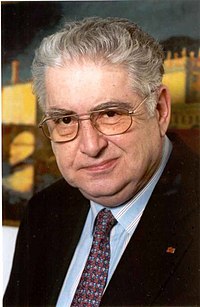Moritz de Hadeln
| Moritz de Hadeln | |
|---|---|
 |
|
| Born |
21 December 1940 Exeter, England |
| Occupation | film director, photographer |
| Years active | 1963 – present |
Moritz de Hadeln (born 21 December 1940 in Exeter, Devon, England) is a Swiss documentary Film director and photographer, who became a Film Festival director. He headed the Locarno International Film Festival from 1972 to 1977, the Berlin International Film Festival from 1980 to 2001 and the Venice International Film Festival in 2002 and 2003. He was also a member of the jury at the 23rd Moscow International Film Festival.
Born in 1940 in Exeter, England, de Hadeln's European family background provided him with a unique education in the Arts. His grandfather Detlev Freiherr von Hadeln was an art historian, his father Harry founded an art edition company in Florence (Italy) and his mother Alexandra Bălăceanu a Romanian immigrant was a painter and sculptor. Moritz de Hadeln after obtaining the French Certificate A level (Baccalauréat), started studying Physics and Chemistry in Paris. He soon joined the film research laboratory Avenue Hoch as an apprentice. After freelancing as a photographer for some years, de Hadeln was given the opportunity to direct his first documentary Le Pèlé in 1963. Followed several years of work with cinematographer Ernest Artaria in Zurich. In 1966, de Hadeln directed his second film Ombres et Mirages and during this same period, worked as a film editor in Zürich together with Yves Allégret and as assistant director at CCC Film Studios in Berlin.
Moritz married Erika von dem Hagen in 1968. In 1969, Moritz de Hadeln and his wife founded the Nyon International Documentary Film Festival (today Visions du Réel film festival) in Switzerland, which he directed until 1979. He assisted Erika when she took over as head of the festival from 1981 to 1993. In those 25 years, they made Nyon a unique meeting place for documentary filmmaking while discovering many new talents. From 1972 to 1977, de Hadeln headed the Locarno International Film Festival, heralding a new era of international recognition for the event. He gave an original profile to the newly introduced outdoor screening on the Piazza Grande and introduced several sidebar events to broaden the festival's international impact.
...
Wikipedia
